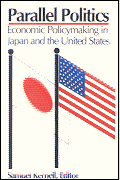While much has been written about economic competition between the United States and Japan, it is easy to lose sight of the fact that their relationship is founded essentially on each sides’ domestic political concerns. Many critics have concluded that to gain a new equilibrium in relations, the two counties must develop a sophisticated appreciation of each other’s political dynamics. Because budgets, taxes and macroeconomic policy are so central to activities of both governments, this book, by Japanese and American experts, focuses on the role of political institutions in formulating economic policy. Despite the differences in the two counties political systems—one-party/parliamentary versus two-party/presidential—there are striking similarities in the way politics is transacted in Japan and the United States. In particular, politicians in both countries are motivated primarily by the desire to serve local constituencies, which leads to overly parochial public policies. Combining case studies and discussions, the contributors provide an overview of the Japanese and American political systems, particularly those aspects that are most relevant to economic policymaking. In addition, they offer a comparative analysis of the politics of budgeting, tax reform, and structural policies
Author
Edited by
Samuel Kernell is professor of political science at the University of California at San Diego and a former senior fellow in the Brookings Governmental Studies program.

